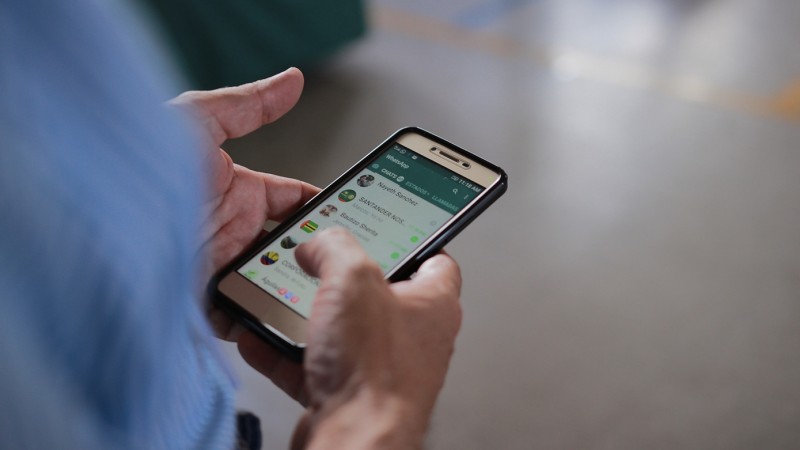WhatsApp Scams Galore!
- Details
- Written by Will from Holland
- Category: Articles

Imagine getting a message saying: "Hi! This is your sister, stuck in Canada. I need money to cross the border. Help me, please!"
Good thing you can pretty easily avoid any of these scams.
You know this one, it's the most common WhatsApp scam, where a trickster is posing as someone you know and asking for money.
For example, your cousin is supposedly way behind in rent and needs money urgently to avoid being evicted. Or, in a text message, your best friend claims to need money quickly to pay the utility bill before getting cut off.
The scammers almost always ask for large amounts, usually $250 or more. In addition, there is always a real sense of urgency and the money must be transferred quickly.
How does it happen?
The scammer searches online for details and profile picture of your family member or friend. They then create a WhatsApp account and starts "apping" you. The scammer opens the conversation by explaining why he suddenly has a different number and a request for money quickly follows. Even though [you think] this scam may be easy to spot and/or avoid, you'll be surprised how many people still fall prey to the scam. Scammers can certainly be convincing.
Check Out This Scam
See what happens when they use a real voice.
One person – we'll call him John, received a call from a stranger and heard nothing on the other end of the line. Later, it turned out that some of his family and friends had been asked for money with John's recorded voice!
What happened?
When John received a call and heard nothing, he said, "Hello, this is John. Hey. I can't hear anything."
When he hung up, he got a text message saying someone was trying to call him, but couldn't get through. The phone rang again, and again, but nothing happened. John said, "Hello. John here. I still can't hear you."
He tried to contact the number unknown to him, but there was no response.
A day later John received a call from a relative, telling him that someone pretended to be him and had asked for money, because he was supposedly stuck and in real need.
The family member was asked for money via WhatsApp message: "This is John. I'm stuck in Yosemite NP with little to no reception and need money for repatriation. Please, please, can you send me $500 asap?"
John's relative called the unknown number and heard the recorded voice say: "Hello, this is John. Hey. I can't hear anything."
John's family member was about to wire money, when his friend said something about this being a scam. They called John at his regular number, only to find out he was at home and just fine.
Yikes! This could've ended badly if it wasn't for his proactive friend.
What does this tell you?
Always make sure you get in contact with the person "in need" before paying anything
Never, ever send money via WhatsApp after receiving a (random) request
Never automatically pay via links in payment requests, not in WhatsApp, but also not in email, text message or even payment apps like Venmo
But what if the message is from a company or even financial institution?
Just like with phishing scams, WhatsApp scammers will also pose as company or even bank employees.
In the message you'll receive, the scammer claims that someone tried to hack your account. That's why you'll need to reset the app. To do so, you're asked to provide your details. This will allow the scammer to access your accounts and take all the information in it. If they get into your bank account, there's no doubt they will drain it.
How do you prevent this from happening to you?
Ignore WhatsApp messages supposedly coming from your bank
Banks in America generally don't use WhatsApp for customer service
Note: some banks (IE. JPMorgan) may start doing so soon – "WhatsApp Banking" as customer service is quite the industry standard for banks and companies in Europe, as well as other parts of the world
Know that many other companies don't use WhatsApp for fraud cases, merely perhaps for customer support
Don't give out any personal or financial information, ever
Let your bank know immediately that fraudulent messages are being sent
Another Version
My verification code sent accidentally.
Sometimes, cyber criminals are not directly after your bank account (and money), but want to take over your WhatsApp accounts instead and go after your contacts. It may be much more lucrative.
How does it work?
The scammer pretends to be your friend or acquaintance, and says he accidentally sent you a WhatsApp code. He then asks if you can provide the verification code. With this code, the criminal can install your account on his own phone and link it to his number.
How do you prevent this from happening to you?
Never give your verification code to anyone else, especially when you receive it at random
Enable two-step verification for WhatsApp
eBay or Craigslist
eBay or Craigslist scammers often use WhatsApp.
You're selling something on a second-hand website. A scammer contacts you and states that they want to make a quick purchase. Usually, you're immediately offered the asking price, or more. However, the scammer would like to "verify the seller's identity first", arguing that there are many scammers active on sites like these. That is why he asks for a copy of a bank statement and ID. This of course allows the scammer to access your bank account and transfer money to himself.
Another method is also used, in which the buyer/scammer sends a payment request of $0.01 via WhatsApp. The link leads to a real looking bank website made by the scammer, leading you to giving access to the scammer by doing so.
How do you prevent this from happening to you?
- Never, ever give a copy of your ID or bank details to strangers
- Don't click on links from people you don't know
- When selling items online, always try to do the hand-off in person
- Only deal with cash when making an online purchase
Avoid Scams by Being Skeptical
Quite a few ways to get scammed via WhatsApp, right?
Good thing you can pretty easily avoid any of these scams by being skeptical and not automatically sending money to (random) requests or people. But if you're ever in doubt, always do research into scams, ask around among family and friends, or even your financial institution or authorities. You can never be too sure!
Good luck out there, and stay safe.
Will









